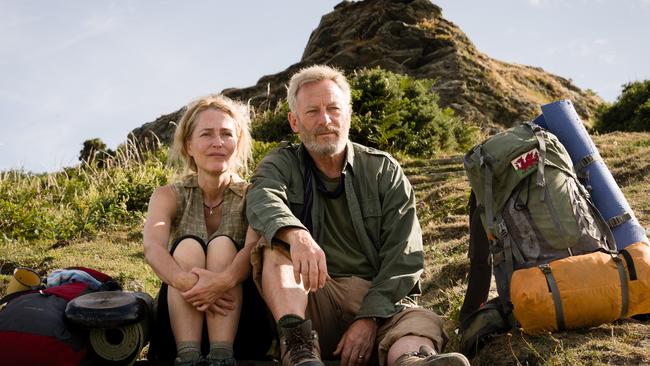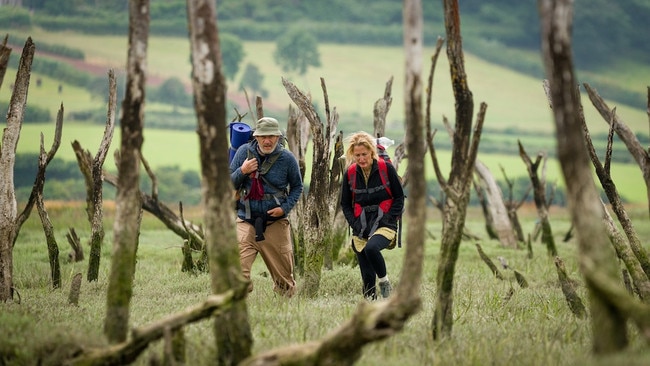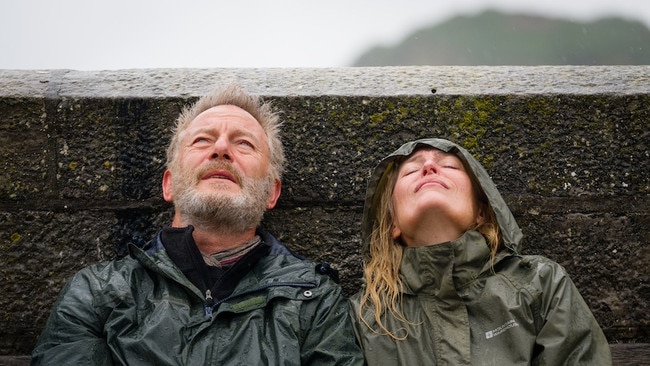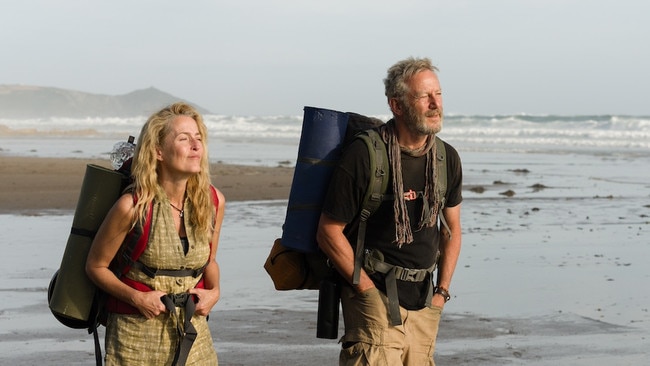The Salt Path review — a story of loss, love and walking
Gillian Anderson and Jason Isaacs are terrific as a couple who embark on a long coastal walk after becoming homeless in this adaptation of Raynor Winn’s bestselling memoir.

The Salt Path (M)
115 minutes
In cinemas
★★★½
Gillian Anderson and Jason Isaacs are terrific in The Salt Path, a story of loss, love and walking based on the bestselling 2018 memoir of the same name by English writer Raynor Winn.
They are wife and husband Raynor (Anderson) and Moth (Isaacs, the FBI-ed businessman husband-father in season three of The White Lotus). They run a small farm in Wales, their livelihood for the past 20 years. They have a son and a daughter, both at university.
Anderson is particularly impressive as a woman removed from her comfort zone. She is resilient but unnerved. The moment she remembers the first time Moth said he loved her is unexpected and beautiful.
We first meet them on the South West Coast Path in South West England, a 1010km walking track that runs from Somerset to Dorset, taking in Devon and Cornwall. It’s the longest uninterrupted path in England.

“Shall we?” Ray asks as they approach the departure point. “Got nothing better to do,” Moth, who walks with a limp, replies.
There’s some truth in what he says. Three flashback stories fill us in on why this middle-aged couple has only a tent to sleep in and instant noodles to eat. One is in a doctor’s office, one is outside a courthouse and the other is at the family farm. “No one’s dead,” Moth tells the children when he and Ray return home from the courthouse. Yet it feels like the death of something is in the air.
You know movies involving walks that focus on the walkers discovering the glory and tranquillity of the natural world? This is not one of them. It’s England, for starters, so it rains a bit. And while there are beautiful locations, the couple’s most common utterances are “Jesus Christ” and “Shit” when they realise the arduousness of the trek. “This is insane,” Ray notes.
The beauty here needs to come from within. There is a striking moment when the couple blames each other for their fate. It suggests repressed anger and resentment.

Rightly or wrongly they pack that away and go on loving and supporting each other. “Do you remember when we used to have all-night sex all the time?” Moth asks as they spend a night in a rainswept tent. “Now I can’t even lift my own rucksack.”
This film is the directorial debut of British dramatist Marianne Elliott, who has four Tony awards and two Laurence Olivier awards to her name. The script is by British playwright and screenwriter Rebecca Lenkiewicz.
The result is an intelligent, bittersweet drama with well-placed moments of humour and humanity. More than one passerby calls Moth Simon. The reason for the misnaming becomes apparent in a delightful scene where a well-to-do couple invites Ray and Moth into their home.

The other beauty is the kindness of strangers. Moth is reading Seamus Heaney’s translation of Beowulf (there’s a vague hint there to his mistaken identity). When he reads it aloud in a public square it’s a reminder that there is so much goodness in the world.
There’s a line in that epic poem that notes “For every one of us, living in this world means waiting for our end.” One of the questions Ray and Moth face is whether an end also can be a beginning. This charming, engaging, well-acted film is all about the need to put one foot in front of the other. Because there are moments in life when that is all you can do.




To join the conversation, please log in. Don't have an account? Register
Join the conversation, you are commenting as Logout